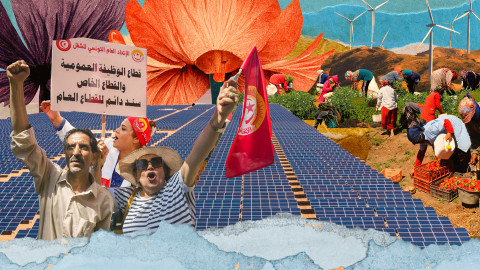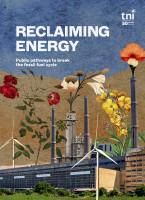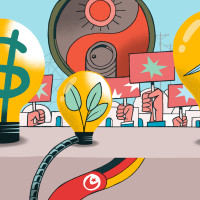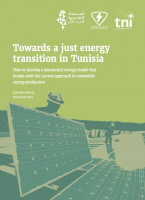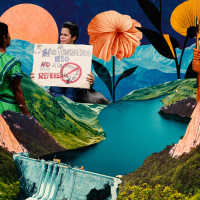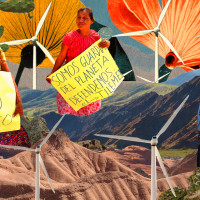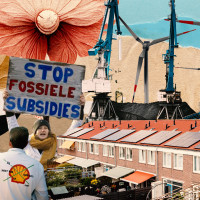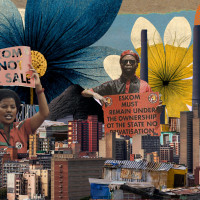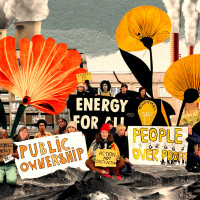To initiate a transition to renewable energy, in 2013, the Tunisian government began to turn to the private sector, arguing that STEG did not have sufficient financial means to promote the transition.The 2013 Law on the production of electricity from renewable energy sources by the private sector was heavily influenced by lobbying by foreign organisations and international financial institutions.7 A core player was the German Development Agency GIZ, which has become a major decision-maker in Tunisian energy transition policy. GIZ’s various activities are centred around conducting research and preparing recommendations for the development of legislation with the goal of enhancing the development of privatised renewable energy, under the pretence of supporting the country’s green energy transition.8
However, as the Tunisian Observatory of the Economy highlights, GIZ’s involvement will primarily benefit the global North. Several private renewable energy generation projects focus on the export of energy through underwater cables, rather than producing energy for local use.9 This benefits governments in Europe, who can continue to extract natural resources, including solar energy, from Tunisia and its neighbours. Ultimately, the renewables initiatives that international institutions and actors such as GIZ have promoted do not serve to enhance energy sovereignty in Tunisia but, rather, reinforce green energy colonialism.
The government’s 2013 plans for fostering renewable energy development through privatisation were met with heavy opposition from the Tunisian General Labour Union (UGTT).10 The union requested that the legislation should be blocked, due to a lack of consultation with social partners, including unions, in the drafting process. The government’s National Constituent Assembly followed the union’s recommendation, creating a space for the Energy Commission and UGTT to meet and discuss the union’s arguments against privatisation. Following the presentation of UGTT’s arguments, the project was shelved, and STEG remained the main body for energy development – at least, for a little while longer.
In 2015, however, two new pieces of legislation (the 2015 Solar Plan and Law 12-2015) were introduced to promote private sector involvement in the energy sector. This time, these laws were successful. The Solar Plan sought to mobilise around €8 billion of investment between 2015 and 2030, two-thirds of which the government hoped to procure from private sources, predominantly foreign.11 While promoting a neoliberal, undemocratic and private ownership structure for renewable energy, this plan reinforces and recreates dependencies on foreign investment and technology, diminishing the role of Tunisian civil society and local businesses in the country's energy transition. This import-based strategy relies on drawing in knowledge in the form of technologies, equipment and patents from Northern countries to facilitate the transition to renewable energy. This exacerbates the country's dependency by increasing external debt and reinforcing the North–South extractive power dynamic. The plan facilitates an economic model driven by foreign investment, which leads to higher costs as loans, interest charges and private profits are eventually paid for by public money and the Tunisian population.
In addition, Law 12-2015 allows the use of agricultural land for renewable energy projects, an infringement of the Tunisian people’s land rights and food sovereignty.12 Tunisia already suffers from severe dependence on imported food, which the privatisation and reallocation of agricultural land only exacerbates.
The 2015 laws also reduced public subsidies for STEG. The updated subsidy policy decoupled STEG's operations from the government budget, making the state-owned company solely financially responsible for the purchase of gas. This decision led to the financial ruin of the company, as STEG relied on state subsidies to cover the difference between the cost of energy production and distribution and the electricity prices set by the state.13 This disastrous policy remained in place for five years, until massive mobilisations by the country's trade unions forced the government to reimburse STEG for losses incurred in 2018.
The government endeavoured to continue its privatisation programme by publishing a model power purchase agreement in early 2017, and then announcing the establishment of the country’s first renewable energy independent power producers (IPPs) in the second half of this year. A total of 29 solar projects (24 10MW solar projects, two 50MW solar projects, two 100MW solar projects and one 200MW project) and four wind projects (30MW) have been awarded to private companies. Of the projects launched between 2017 and 2019, half include joint ventures with foreign and Tunisian companies, while only four are exclusively led by Tunisian companies. Five projects are owned by French companies and three by German companies, reinforcing colonial power structures and excluding local companies and expertise.
In addition to increasing dependency, the reforms of the Tunisian energy sector do not provide the state with the necessary tools to remedy the negative effects of privatisation and to ensure the protection of citizens' interests.14 These reforms give the government limited control and oversight mechanisms to prevent ‘green grabbing’. Local communities and civil society are given little information on public–private partnership proposals and are excluded from policy discussions. What’s more, there are no provisions for the right to compensation for communities affected by private energy projects.
